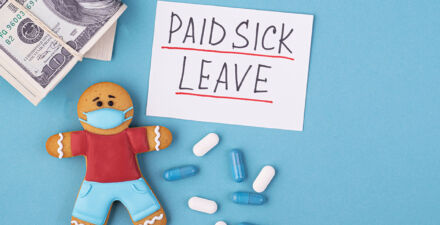Frequently asked questions about paid sick time for U.S. workers and their families and the broader U.S. economy

Sometimes people in the United States experience health conditions that affect their ability to work, whether it’s a cold, flu, or cancer. This may lead to questions about whether they can take time off from work to address their health, without sacrificing pay. Below, we address and answer frequently asked questions about what paid sick time is, and how it affects the U.S. economy.
Question: What is paid sick time for?
Answer: Workers often need paid time away from their jobs, whether they are experiencing a short-term illness, undergoing a surgery and recovery that will last a few days, or simply visiting the doctor for a wellness exam. In the United States, paid sick time allows workers to address such short-term needs. It also allows workers to spend time caring for their loved ones when they fall ill or suffer an injury.
Q: How can U.S. workers access paid sick time?
A: Some employers voluntarily offer paid sick time to their workers, and currently 36 states and localities require that employers provide paid sick time, though workers have no federal right to paid sick time, meaning some workers do not have access to paid sick time.
Q: Who does and doesn’t have access to paid sick time?
A: Seventy-eight percent of U.S. workers can access paid sick time through their employers. But paid sick time is out of reach for typical low-income workers. Only 4 in 10 workers in the lowest-paid jobs, who are disproportionately workers of color, have access to paid sick time.
Q: Is paid sick time an economic policy?
A: The primary purpose of paid sick time is to allow workers to address short-term medical needs without suffering economic hardship. But paid sick time also benefits employers and the overall U.S. economy. In supporting personal health, public health, and productivity, paid sick time helps stabilize and grow the U.S. economy.
Q: What does paid sick time do for U.S. businesses?
A: Paid sick time policies reduce rates of worker turnover and lower rates of absenteeism, both of which lead to productivity gains for U.S. businesses. Paid sick time also helps businesses reduce the incidence of occupational injuries.
Q: What does paid sick time cost U.S. employers?
A: One study estimates the cost of providing paid sick leave was just 2.7 cents per worker per hour, and other research shows that when businesses implement paid sick-time policies, they do not cut other employer-provided benefits, indicating that employers are likely to be able to absorb the average cost of providing paid sick time.
Q: What does paid sick time do to help the broader U.S. economy?
A: Controlling communicable disease is essential to ensuring that workers are able to produce goods and services and that consumers will purchase those goods and services—in other words, to ensuring that large parts of the economy can function normally. Local paid sick-time laws reduce influenza-like infections by 30 percent to 40 percent. Similarly, when the federal government enacted a temporary, coronavirus-specific paid sick time policy in 2020 through the Families First Coronavirus Response Act, states where workers gained new access to the emergency paid sick leave program saw COVID-19 cases drop by 56 percent.
Q: Are there efforts to extend paid sick time to all U.S. workers?
A: Federal policies are needed to ensure that all workers can access leave to address health issues they or their loved ones face, thus encouraging long-run economic growth and benefitting the overall U.S. economy. One bill that proposes a federal paid sick time policy is the Healthy Families Act.







